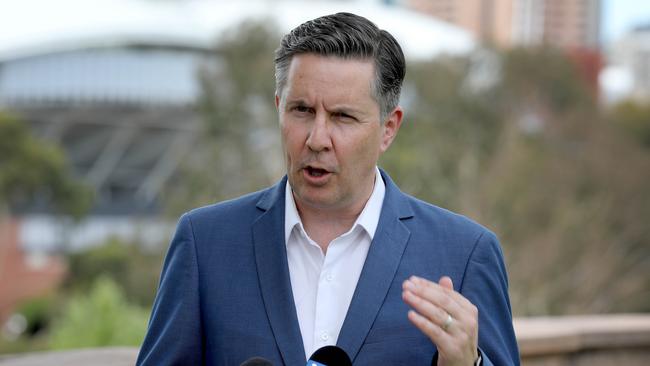
It is doubtful whether this issue moves any votes outside the wealthy suburbs where the anti-Liberal independents parade integrity as their calling card – yet the idea of a corrupt political system is taking hold. It has deep roots in Australia’s culture with the notoriety of the NSW Rum Corps being the first instance in Sydney’s long history of ruling-class corruption.
The chorus to this election is that “politics is broken”, the two-party system has failed and, off the back of multiple pork-barrelling by the Morrison government, the accusations by Labor and the anti-Liberal independents that the current government is corrupt. The long-held justified view that national government in this country is remarkably clean has passed into history and the consequences will be far-reaching.
Labor’s answer is a national anti-corruption commission with the party astute enough to limit its proposal to seven principles that will guide its model, the conclusions being it is serious and that its model could change the contours of Australian government. Anthony Albanese has long pledged to end “the Morrison government’s shameful tolerance for corruption”.
Turning up the political heat on Scott Morrison, Albanese pledges to legislate this year. Asking the public if it wants an anti-corruption body is like asking kids if they want ice cream. It follows: corruption is bad, integrity is good. This media-driven polemic is one of the easiest and shallowest in years.
While Albanese’s line is that the public has waited more than 1200 days for action, the nation has somehow survived for 121 years without such integrity stardust. Each state has such a body. Does anybody seriously assert there is more integrity and less corruption in state governments because they possess such commissions? That view is bunkum. The public is being sold a bill of goods. It begins with the fantasy promoted by Labor, the independents and retired judges that the anti-corruption commission will end rorts and pork-barrelling. This is a ludicrous notion.
Opposition health spokesman Mark Butler told the ABC’s Insiders the new body “will clean up these rorts”. Albanese recited the long list – many exposed by the Auditor-General – including sports rorts, commuter carparks, land purchases for inflated prices and $444m given to the Great Barrier Reef Foundation without any tender. Stephen Charles, a former judge of the Victorian Court of Appeal and an activist with the Centre for Public Integrity, brands the sports and carpark schemes as corrupt.
Yet pork-barrelling, an odious, often nebulous concept, is as old as politics. It needs to be identified and condemned where it occurs. But when does it become corrupt? When 60, 70 or 80 per cent of program funds go to governments seats? Safe seats or marginal seats? Who decides? What about pork-barrelling by age, by industry, by regulation? Is pork-barrelling only corrupt if it breaches public trust? If so, how is this determined?
State commissions, including the NSW Independent Commission Against Corruption, have largely or completely shunned findings on rorts and pork-barrelling. The reason is obvious: the absence of proven and effective basis for such findings. Yet we are being told a new federal body will solve the problem. This is either laughable or frightening. Laughable as a viable proposition but frightening if a federal body is designed to shift pork-barrelling into the corruption ledger.
The mindset at work here is dangerous: it is the judicialisation of politics and, if tried, will end in grief. Our mechanisms to expose rorts are impressive; witness the Auditor-General. But efforts to look outside the system of governance and vest an unelected former judge in a new commission with enforcement powers against ministers and officials engaged in alleged pork-barrelling will create only more disputes than it will resolve. It would be a serious blunder.
Yet rorts are really a sideline to the bigger issues.
The progressive lobby seeks to construct the NSW ICAC model at the federal level. This enshrines a broad definition of corruption; its purpose is public exposure of alleged corrupt behaviour as deterrence, holding show trials and, incredibly, vesting in ICAC the power to make findings in relation to the ministerial code of conduct drafted by premiers and prime ministers.
Translation of this model to national politics will be divisive, polarising and damaging to effective government. ICAC can begin an investigation on its own or on a complaint made to it. Allegations of improper behaviour and corruption are now a standard tactic in national politics and any mixture of ICAC’s powers with its generous definition of corruption means the new commission will become weaponised in party conflict.

Witness Albanese’s claim that “minister after minister” in Morrison’s government has an integrity problem and that opposition legal affairs spokesman Mark Dreyfus has overseen 10 referrals of Coalition MPs to police or other agencies, despite getting no results.
The 2019-22 term saw the dubious behaviour of Morrison ministers colliding with the frustration of Labor and the progressive media in not being able to claim their political heads.
A federal ICAC constitutes a transfer of power and a shift in governance philosophy. Its real purpose, in part, is to respond to the perceived demise of ministerial responsibility within the executive and parliament by creating a new fourth estate – an independent body with immense powers of coercion, secret hearings, public hearings, phone interception and findings beyond remedy. Once any federal ICAC has the legal power to make findings on the prime minister’s code of conduct – a point on which retired judges Anthony Whealy and Charles absolutely insist – then enforcement of ministerial responsibility is shifted from the prime minister to the ICAC body. Indeed, these judges are incensed that enforcement of the prime minister’s code resides with its author, the prime minister, assisted by the public service.
They assume because the system cannot be trusted, from the top down, this power must be shifted to a presumably all-wise, former judge, with the ability to make a finding that terminates the career of any public official including the prime minister. Indeed, the empowered institutions, ICAC and the media, ensure that early resignation is the only option.
The flaws in the model are known from the long list of casualties – former prosecutor Margaret Cunneen, who went to the High Court to win against ICAC; former NSW premier Nick Greiner, forced to resign when innocent; and former premier NSW Barry O’Farrell, not corrupt but caught forgetting a bottle of wine gift when giving evidence.
The Liberals have lost the integrity debate. In fact, they never fought it, having produced a bill that was never debated largely because of internal divisions. If Albanese wins, Labor’s decision on the model will be decisive. And given the experience of its senior figures, their realism and self-interest, there is every possibility Labor would ditch the demands of activist former judges and settle for something far more modest and workable.







The political failures of the Morrison government allied with the embrace of progressive ideology by its opponents has generated a bizarre outcome – elevation of a national anti-corruption commission as an alleged frontline election issue.